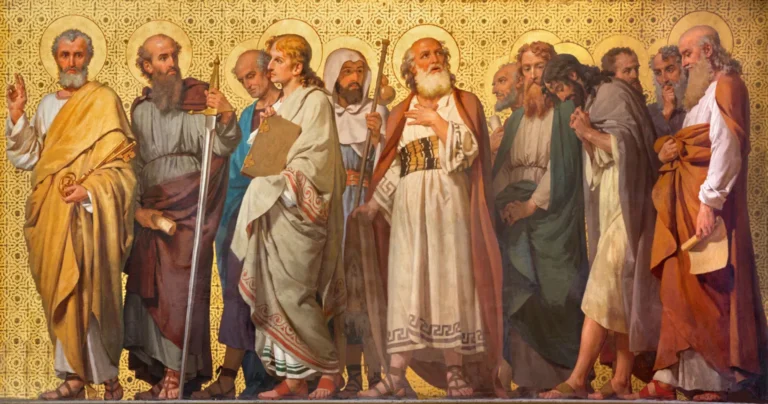Ever wonder if Paul knew his letters would end up in the Bible? Or if the Gospel writers had any idea that what they were writing would be read and studied for thousands of years?
There’s a common belief out there—one you might have heard, that the New Testament was just a collection of informal letters and reflections. Over time, the theory goes, the church simply picked the ones they liked best, called them “Scripture,” and created the Bible.
But what if that’s not what happened at all?
What if the New Testament authors actually knew they were writing with authority? What if they understood their role as spokesmen for Jesus Christ? And what if the early Christians were expecting new Scripture from the very beginning?
Let’s take a closer look at what was really happening when the New Testament came together—and why you can trust that it wasn’t a human invention, but a divine assignment.
1. The Writers Knew They Spoke with Authority
The apostle Paul didn’t see himself as just offering advice or encouragement—he wrote as someone commissioned by Jesus to speak on His behalf. That’s what the role of an apostle was all about. Apostles weren’t merely church leaders or good communicators. They were official representatives of Christ. When they spoke or wrote in that role, they weren’t just giving their opinion—they were delivering the Word of God.
Listen to how Paul opens one of his letters: “Paul, an apostle of Christ Jesus by the will of God…” (Ephesians 1:1). From the very beginning, he’s reminding the readers that he’s not self-appointed. He was sent. His authority didn’t come from his experience or education—it came from Christ Himself.
Paul gets even more direct in 1 Corinthians 14:37–38:
“If anyone thinks himself to be a prophet or spiritual, let him acknowledge that the things which I write to you are the commandments of the Lord. But if anyone ignores this, he himself will be ignored.”
That’s a bold statement. Paul isn’t saying, “Here’s my advice.” He’s saying, “This is what the Lord commands.” And if someone refuses to recognize it as such, Paul says they shouldn’t be recognized as a spiritual authority at all.
This wasn’t a one-time claim. Throughout his letters, Paul constantly reminds the church of his role as Christ’s messenger. The other apostles understood this too—and they treated each other’s writings with that same level of authority.
2. The Early Church Treated These Writings as Scripture
Paul wasn’t the only one who knew his writings were Scripture. The early church recognized it too. In 2 Peter 3:15–16, the apostle Peter refers to Paul’s letters and places them alongside the Old Testament Scriptures:
“…just as our dear brother Paul also wrote you with the wisdom that God gave him… His letters contain some things that are hard to understand, which ignorant and unstable people distort, as they do the other Scriptures…”
Peter doesn’t just acknowledge Paul’s writings—he puts them in the same category as “the other Scriptures.” That’s a huge statement, especially coming from a fellow apostle.
So no, the church didn’t stumble upon Paul’s letters centuries later and decide they were good enough to be Scripture. They knew it from the beginning. These were the words of Jesus delivered through His chosen messengers. That’s why churches copied them, passed them around, read them out loud in worship, and built their lives on them.
3. Early Christians Expected New Scripture
Here’s something many people miss: early Christians didn’t just accept the New Testament—they expected it. Why? Because they understood what it meant to live under a covenant.
The word “testament” literally means “covenant.” So when we talk about the New Testament, we’re talking about the written record of a new covenant between God and His people through Jesus Christ.
In the Old Testament, every covenant came with written documents. Think back to Mount Sinai—when God made a covenant with Israel, He didn’t just speak it. He wrote it. He gave Moses two stone tablets with the commandments engraved on both sides (Exodus 32:15–16).
In the ancient world, this was common practice. When two kings made a treaty (a covenant), they each got a copy of the agreement. So when God made a covenant with Israel, He gave them a written record. And when God promised through the prophet Jeremiah that He would make a new covenant (Jeremiah 31:31–33), the people would’ve expected a new written record too.
That’s why, when Jesus said at the Last Supper, “This cup is the new covenant in My blood…” (Luke 22:20), it signaled something massive: a new covenant had begun. And with it would come new covenant documents—what we now call the New Testament.
So when the apostles wrote the Gospels and letters, they weren’t doing something strange or unexpected. They were doing what God’s people had always done: recording the covenant so it could be remembered, shared, and obeyed.
4. What This Means for Us Today
The authority of the New Testament doesn’t rest on a church vote or a fourth-century council. It was there from the beginning—because the writings came from those appointed by Jesus to speak on His behalf. They wrote with that awareness, and the early church recognized it immediately.
So when you open your Bible today and read the words of Paul, Peter, John, or any other New Testament writer, you’re not just reading historical reflections or theological opinions. You’re reading the very Word of God.
These books weren’t voted in—they were received. Because God’s people, filled with the Holy Spirit, recognized the voice of their Shepherd when they heard it (John 10:27).
Conclusion: Scripture Wasn’t Assigned—It Was Recognized
Let’s clear up the misconception once and for all: the New Testament authors weren’t writing casually, only to have their words “promoted” to Scripture centuries later. They wrote with authority from the start—because they were sent by Christ. And early Christians didn’t just stumble into accepting these writings. They expected them.
You can trust your Bible. Not because people made it sacred, but because God gave it to us through faithful messengers—and the church recognized His voice in every word.
Coming Up Next: Think early Christians were all over the place, reading totally different Bibles? In the next post, we’ll explore the question: “Was there chaos over which books belonged in the New Testament?”
Want to get the full series? Subscribe to our newsletter for weekly posts and insights as we walk through the 7 biggest questions people ask about the Bible’s trustworthiness. Let’s keep growing together.









